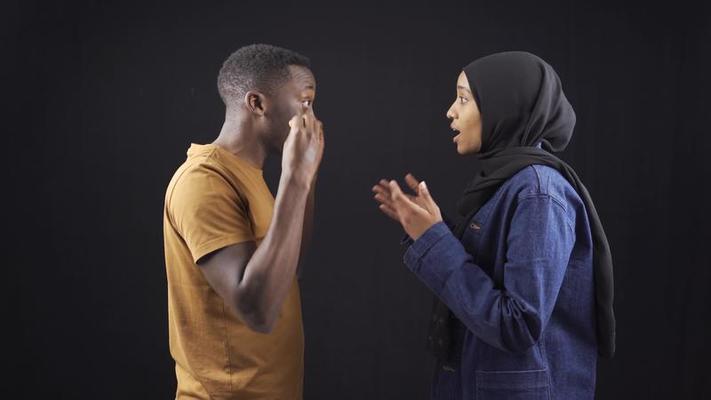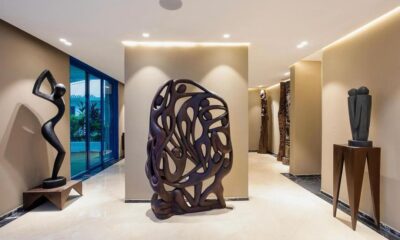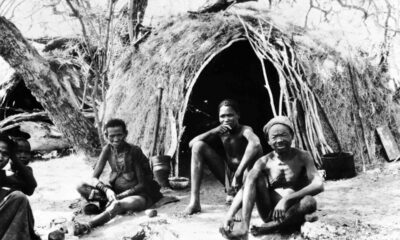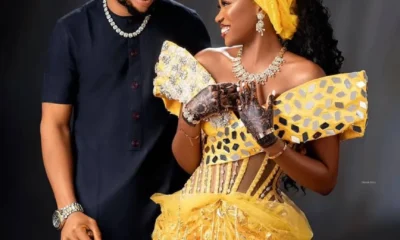ARTS & CULTURE
Why Is Kano State The Divorce Capital Of Nigeria?
Published
9 months agoon
By
wpadminee
Kano State has gained notoriety as the “divorce capital” of Nigeria due to its alarmingly high rates of marital dissolution. This phenomenon has attracted attention from sociologists, policymakers, and the media.
Let’s explore the factors contributing to this situation based on available research and reports:
According to various reports, Kano State consistently records some of the highest divorce rates in Nigeria. The Kano State Hisbah Board, which handles marital issues among Muslims, reported processing over 80,000 divorce cases between 2020 and 2021 alone. These numbers are significantly higher than those reported in other Nigerian states.
1. Cultural and Religious Factors
Kano State is predominantly Muslim, and Islamic law allows for relatively easy divorce proceedings. Under Islamic law, a man can divorce his wife by simply pronouncing “talaq” (divorce) three times. This ease of divorce can contribute to higher rates of marital dissolution.
2. Economic Pressures
Economic hardship is often cited as a major factor in Kano’s high divorce rates. Many couples struggle to meet basic needs, leading to stress and conflicts within marriages. The economic downturn in Nigeria has hit Kano particularly hard, exacerbating these issues.
3. Early Marriages
Child marriage is still practised in parts of northern Nigeria, including Kano State. These early marriages often lead to divorce as young couples struggle with the responsibilities of married life and may grow apart as they mature.
4. Lack of Marital Education
Many couples in Kano enter into marriage without adequate preparation or understanding of marital responsibilities. This lack of premarital counselling and education can lead to misunderstandings and conflicts that ultimately result in divorce.
5. Polygamy
While polygamy is accepted in Islamic law, it can create tensions within families. Disputes between co-wives or feelings of neglect can lead to divorce, particularly if the husband struggles to treat all wives equally as required by Islamic teachings.
6. Changing Social Norms
As more women in Kano gain education and economic independence, they may be less willing to tolerate unhappy marriages. This shift in social dynamics can contribute to higher divorce rates as women feel more empowered to leave unsatisfactory relationships.
8. Lack of Conflict Resolution Skills
Many couples lack the necessary skills to resolve conflicts effectively. Without proper communication and problem-solving abilities, minor disagreements can escalate into irreconcilable differences.
While Kano’s situation is complex and influenced by multiple factors, it highlights the need for comprehensive approaches to strengthen marriages and support families. This includes addressing economic challenges, providing better marital education, promoting gender equality, and offering accessible counselling services.
As Kano State grapples with its reputation as Nigeria’s divorce capital, continued research and targeted interventions will be crucial in understanding and addressing this multifaceted issue. The situation in Kano serves as a case study for other regions facing similar challenges, emphasizing the importance of balancing cultural traditions with evolving social dynamics to promote stable and healthy marriages.
Check here for more updates on culture.
You may like
-


Here Are The 7 Most Ancient Countries On Earth
-


Ben Affleck & Jennifer Lopez Officially Finalise Divorce Settlement 2 Years After Marriage
-


6 Best Art Galleries To Visit In Lagos
-


5 Cheapest States To Live In Nigeria
-


Why Ancient Africans Were Naked And Didn’t Care About “Decency”
-


Fairytales Do Come True – Actor Charles Okocha Ties The Knot With Fiancé
ARTS & CULTURE
Ijele Masquerade: The “King Of Masquerades” In Igbo Land
Published
3 months agoon
December 21, 2024By
wpadminee
The Ijele Masquerade, often referred to as the “King of Masquerades,” holds a revered position in Igbo culture. It is not only the largest masquerade in Africa but also a symbol of unity, spirituality, and cultural identity among the Igbo people.
Its towering presence, vibrant artistry, and profound symbolism make it a centrepiece of Igbo traditions.
The Ijele Masquerade originated in southeastern Nigeria, particularly in Anambra and Enugu states. Oral traditions trace their roots to the Akwunechenyi dance group in Umueri.
It began as a celebratory and protective figure, initially created to intimidate invaders and celebrate royalty. Over time, it evolved into a cultural icon representing greatness and the Igbo people’s connection to their ancestors.
Standing between 12 and 15 feet tall, the Ijele Masquerade is a marvel of craftsmanship. It is constructed from bamboo, colourful fabrics, and intricate carvings.
Its structure is divided into two segments: the upper (Mkpu Ijele) and the lower part (Akpakwuru Ijele), separated by a symbolic python figure, Eke-Ogba.
This design signifies the balance between the spiritual and earthly realms. The preparation of the masquerade requires extensive collaboration, with over 100 men working for six months to complete its elaborate design.
Cultural and Spiritual Significance of Ijele Masquerade
The Ijele Masquerade embodies the collective spirit of the Igbo community. It is a representation of the ancestors’ guidance, protection, and blessings.
Traditionally performed during festivals, burials, and special ceremonies, the Ijele is believed to have spiritual powers, such as warding off evil spirits, promoting fertility, and bringing healing.
Its performance is both a spectacle of entertainment and a deeply spiritual ritual that connects the living to their heritage.
The Ijele Masquerade is a highlight of Igbo cultural festivals, often serving as the grand finale. Accompanied by music, drumming, and traditional dances, its performance captivates audiences with its grandeur and artistry.
These events also serve as a platform for preserving and promoting Igbo heritage, attracting tourists, and generating economic benefits for the community.
Challenges Facing Ijele Masquerade
Despite its cultural significance, the Ijele Masquerade faces challenges in the modern era. Urbanisation, globalisation, and declining interest among younger generations threaten its preservation.
The elaborate nature of its preparation also requires significant funding and resources, which are often scarce. Additionally, cultural appropriation by outsiders risks diluting its authenticity and significance.
Efforts to preserve the Ijele Masquerade have gained international recognition. In 2009, UNESCO listed it as an intangible cultural heritage in need of safeguarding.
This recognition highlights the importance of supporting local communities to maintain their traditions. Advocacy for funding, education, and tourism initiatives is vital to ensuring the continuity of this cultural treasure.
A Symbol of Igbo Identity
The Ijele Masquerade remains a powerful symbol of Igbo identity and resilience. It is a testament to the creativity, spirituality, and unity of the Igbo people.
As it continues to inspire pride and admiration, the Ijele Masquerade underscores the importance of preserving cultural heritage in a rapidly changing world.
By supporting initiatives that promote Ijele, individuals and organisations can help sustain this remarkable tradition for future generations.
Its legacy is not only a source of pride for the Igbo people but also a significant contribution to the global appreciation of cultural diversity.
For further details about the Ijele Masquerade, see sources like UNESCO’s Intangible Cultural Heritage listing and articles exploring its cultural significance.
Read more on culture here.
ARTS & CULTURE
Does Anklet Really Signify Promiscuity?
Published
4 months agoon
December 7, 2024By
wpadminee
What is an anklet?
An anklet is a versatile piece of jewellery that women typically wear around their ankles. Crafted from materials like chains, beads, or a mix of both, anklet meanings vary across cultures and styles.
Many fashionable women choose anklets to make a bold style statement, embracing their elegance and charm.
In Nigeria, people often call this accessory a “leg chain” or “ankle chain,” reflecting its cultural relevance. In pop culture, it’s popularly known as an “ankle bracelet.”
Anklets here focus more on fashion than symbolism, though interpretations can differ. With various styles and intricate designs available, anklets offer countless aesthetic options, allowing women to showcase their personal flair.
Ultimately, anklet meanings can be deeply personal, influenced by tradition, culture, or simply individual taste.
Cultural and Historical Significance
Throughout history, anklets have held different meanings across various cultures. While some view them as mere adornments, others have associated them with deeper, sometimes controversial, connotations.
In some societies, ancient and modern, anklets symbolise promiscuity.
Early Usage in Ancient Civilisations
Egypt is often credited as the birthplace of anklets, but India played a significant role in their widespread acceptance. In India, anklets were part of traditional attire, known as pattilu, payal, or nupu.
These terms also include Paujinupur and padapadma. Early Indian literature, such as the first-century epic Silappatikaram, mentions anklets, highlighting their cultural importance.
Rajasthani women were known for their elaborate anklet designs, reflecting regional traditions.
Among the Odisha people, gold anklets were once reserved for warriors, while brides included them as part of their wedding regalia.
Married women often wore anklets to signify their marital status, and dancers used those with dangling bells to enhance their performances.
Similarly, in ancient Egypt, anklets indicated social status. Wealthy women wore gold anklets, while silver or leather versions were common among slaves and the poor.
These accessories, known as menefret or kholkai, reflected one’s place in the social hierarchy. Interestingly, some accounts suggest that anklets were linked to temple worshippers and even prostitutes, though these claims remain largely unverified.
Modern Evolution and Symbolism
Over time, the meaning of anklets has evolved significantly. In the 1970s, during America’s “sexual revolution,” anklets became symbols of female empowerment and liberation.
This era emphasised women’s freedom to express themselves, including their sexuality. Consequently, anklets began to carry connotations of promiscuity, especially within the “hotwife” culture.
The “Hotwife” Phenomenon
A “hotwife” refers to a married woman who engages in consensual extramarital relationships with her husband’s approval. Various anklet symbols reflect this dynamic:
- Two male symbols and one female symbol: Indicate openness to relationships with men of any race.
- Queen of spades: Represents a preference for Black men.
- Heart symbol: Suggests a happy marriage that includes mutually beneficial intimate relationships outside the primary partnership.
- The key to happiness: Denotes a marriage where the husband’s extramarital activities are contingent on his wife’s consent.
Anklets in Contemporary Nigerian Fashion
Today, many Nigerian women wear anklets purely for their aesthetic appeal, often unaware of the historical or cultural associations. For them, anklets are fashion accessories, not symbols of promiscuity or class distinction.
Despite lingering societal judgments, especially within conservative African contexts, it’s essential to recognize that fashion choices are personal.
Women should not face harsh criticism for wearing anklets, as these judgments stem from outdated or culturally irrelevant perspectives.
In conclusion…
Anklets are versatile fashion pieces that have transcended their historical roots. While some cultural connotations persist, modern women wear anklets to express their style and individuality.
It is crucial to separate fashion from judgement and allow women the freedom to make their own choices about their bodies and accessories.
Let’s appreciate anklets for what they are today: beautiful, empowering symbols of self-expression.
Read more articles here.
AFRICAN
The Only 4 African Countries That Have Won Miss Universe Title
Published
4 months agoon
December 7, 2024By
wpadminee
While many African countries have sent representatives to the pageant, only a few have managed to clinch the coveted Miss Universe crown.
The Miss Universe pageant is one of the most prestigious beauty pageants worldwide. It has been a stage for countless beautiful women to showcase their elegance, intelligence, and talent.
1. South Africa
South Africa is the African country with the most Miss Universe wins. This stunning nation has produced four Miss Universe winners:
- Margaret Gardiner (1978)
- Demi-Leigh Nel-Peters (2017)
- Zozibini Tunzi (2019)
- Andrea Meza (2020)
These South African beauties have not only captivated the world with their beauty but have also used their platforms to advocate for important social causes.
2. Namibia
Namibia, a small country in Southern Africa, has also made its mark on the Miss Universe stage.
- Michelle McLean won the Miss Universe title in 1992.
This stunning Namibian beauty brought pride to her nation and continues to be an inspiration to many.
3. Angola
Angola, a country rich in culture and natural beauty, has also produced a Miss Universe winner.
- Leila Lopes was crowned Miss Universe in 2011.
Her win marked a significant moment for Angola and showcased the beauty and talent of African women.
4. Botswana
Botswana, a landlocked country in Southern Africa, may be small, but it has produced one of the most iconic Miss Universe winners.
- Ntsepa Motsepe won the Miss Universe title in 1999.
Her win was a surprise to many, but it solidified Botswana’s place in the pageant world.
These four African countries – South Africa, Namibia, Angola, and Botswana – have proven that African beauty is truly global.
They have inspired countless young women across the continent and beyond to dream big and pursue their passions.
As the Miss Universe pageant continues to evolve, we can only hope to see more African countries adding their names to this prestigious list.
Check here for more articles.
Latest


Samsung Galaxy S25 Series Sets The Standard Of AI Phones As A True AI Companion
Samsung Galaxy S25 series sets the standard of AI phones as a true AI companion …Pioneering the multimodal era with...


5 Things To Expect In Afrobeats In 2025
Afrobeats is poised to reach unprecedented heights in 2025 as Nigerian music continues its remarkable global ascent. The genre’s explosive...


Here Are The 7 Most Ancient Countries On Earth
The oldest countries in the world stand as remarkable testaments to human civilisation, each containing landscapes and monuments that narrate...


Why Self-Reflection Is More Important Than Resolutions
Millions of people embark on a yearly ritual: they sit down with a notebook and pen, eager to craft a...


Nollywood Director, Kemi Adetiba Teases King Of Boys 3
Nollywood director Kemi Adetiba has revealed that another instalment of King of Boys will be released on December 25, 2025....


John McEnroe Says He Can Be The Commissioner Tennis Needs Amid Doping Crisis
Recent doping controversies involving top players have not damaged tennis’s reputation, but John McEnroe believes that appointing a single commissioner...


“Everybody Loves Jenifa” Becomes Nollywood’s Highest-Grossing Film Of All Time
Nollywood filmmaker Funke Akindele has achieved a historic milestone with her latest film, “Everybody Loves Jenifa.” The film has officially...


FG To Premiere TV Series, “Hidden Riches” On Mining Sector On January 25
Nigeria’s Federal Government will launch an ambitious television drama series focused on the nation’s mining sector, premiering “Hidden Riches” on...


Qing Madi Delivers A Soulful Performance Of “Favourite Pyscho”
Rising Afro-RnB sensation Qing Madi launches into 2025 with a mesmerising performance on the prestigious COLOURS platform, showcasing her latest...


Taiwo Awoniyi’s First Goal Of The Season Seals Nottingham Forest’s Win Over Wolves
Taiwo Awoniyi made a triumphant return to Premier League action. He scored in stoppage time to help Nottingham Forest crush...
-Ad-




